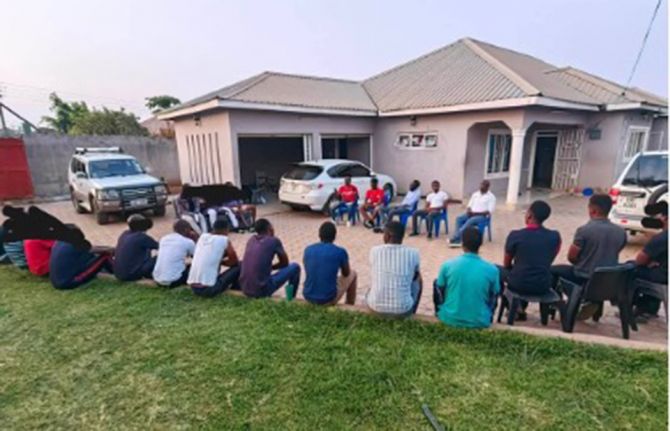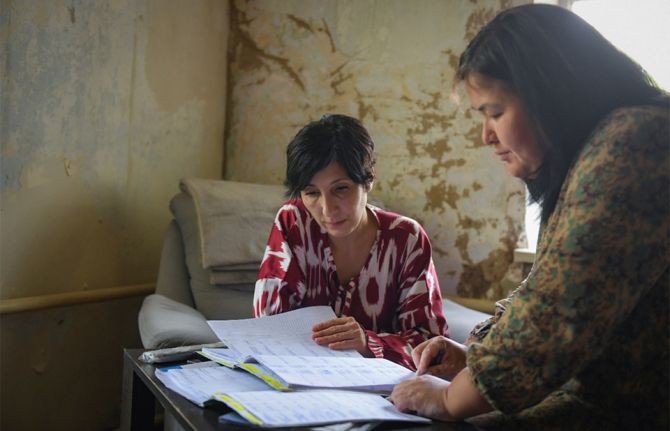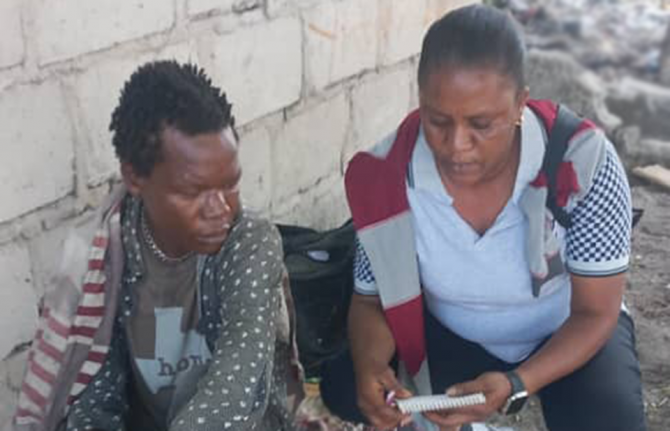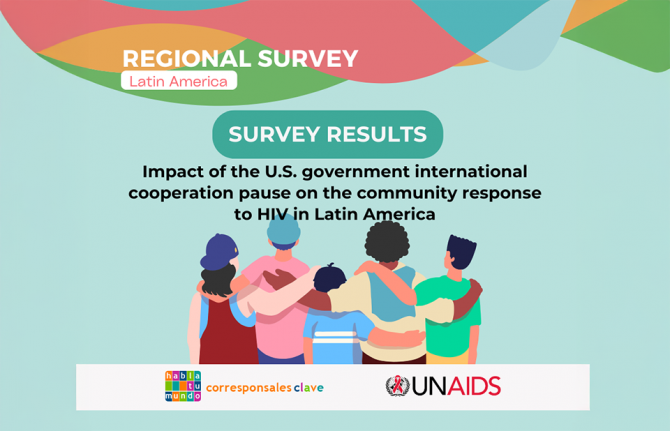
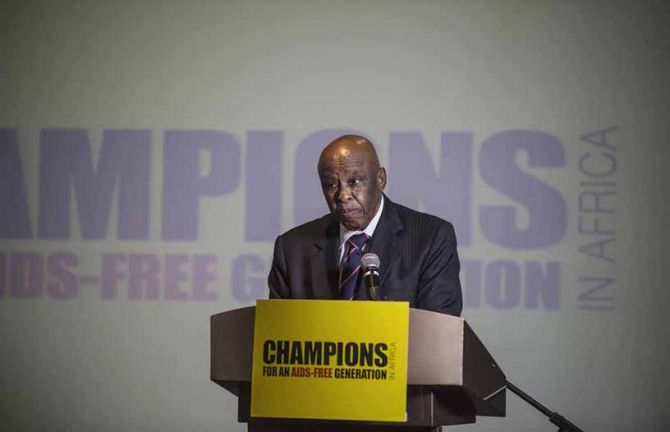
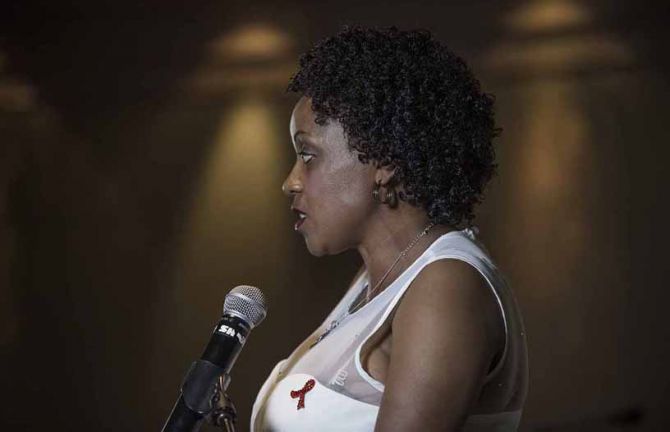
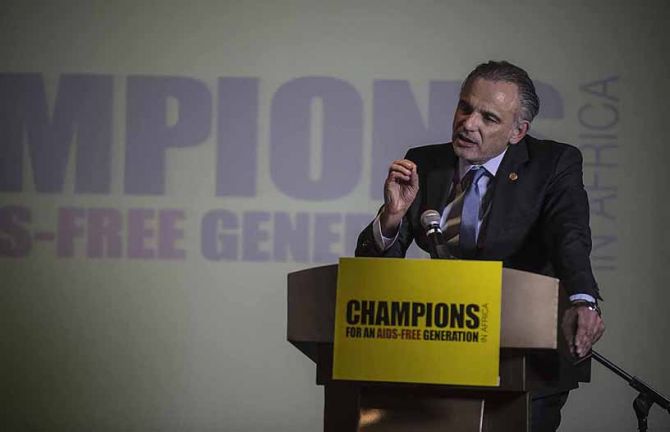

Update
Champions for an AIDS-Free Generation in Africa celebrate partnerships
15 April 2015
15 April 2015 15 April 2015The Champions for an AIDS-Free Generation in Africa—a distinguished group of former Presidents and influential African leaders—hosted a dinner in Johannesburg, South Africa, on 13 April to celebrate the role played by partnerships in ending the AIDS epidemic.
The evening included speeches to welcome five new Champions, a powerful contribution from a mother living with HIV and a special musical performance from Loyiso Bala, UNAIDS National Goodwill Ambassador for South Africa. Private sector representatives also pledged their support to move forward with the Champions.
Champions who attended the dinner included Festus Mogae, former President of Botswana and Chairperson of the Champions, Kenneth Kaunda, former President of Zambia, Alpha Oumar Konaré, former President of Mali, and Kgalema Motlanthe, former President of South Africa.
The dinner came at the end of the first of three days of meetings and talks between the Champions and their partners to mark a strengthened commitment to ensuring that all children are born free from HIV and that both children and mothers living with HIV have access to life-saving treatment. During the day, the Champions also announced that they are extending the scope of their work to cover adolescents and HIV.
Partners attending the three day-meeting include UNAIDS, the South African Development Community (SADC), the SADC Parliamentary Forum, the Economic Community of West African States and the South African Broadcasting Corporation) Foundation.
Quotes
"The 21st century can only be Africa's century if our young people manage to stay healthy and free from new HIV infection, because the inconvenient fact shows us that they are at high risk of new infections."
“I am honoured to attend this very important meeting. I am going to work and work until the job of ending the AIDS epidemic is done. I don’t know about you but I’m ready.”
"Once the cause of ending AIDS is attained, the Champions become winners and we render ourselves irrelevant."
“We have the knowledge and the science to end the epidemic, but we need political leadership to break the complacency and to restore the urgency to the AIDS response.”
"We have a duty to protect young people and provide them with the continuity of care. We must realize that we can’t do business or grow our economies with an unhealthy workforce.”
"The Champions can be our voices so that governments can be encouraged to provide HIV prevention, treatment and care services to all women living with HIV."
Related

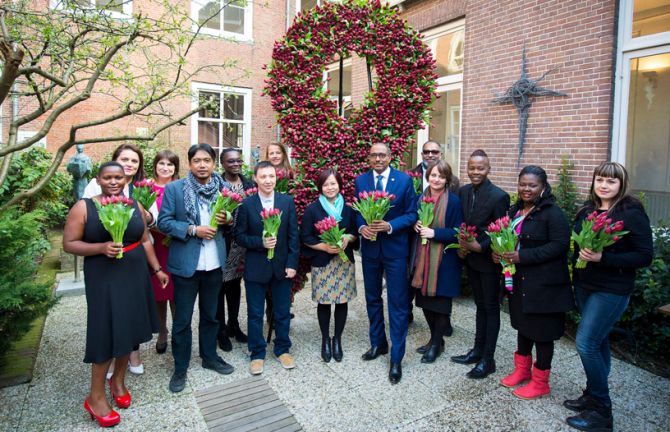
Update
Leaving no one behind in the AIDS response
13 April 2015
13 April 2015 13 April 2015During a visit to the Netherlands, UNAIDS Executive Director Michel Sidibé underlined the importance of leaving no one behind in the response to AIDS. Mr Sidibé applauded the support the Netherlands provides in the global response to AIDS and said the country’s leadership would remain crucial to ending the AIDS epidemic as a public health threat by 2030.
During his visit, Mr Sidibé met the Minister for Foreign Trade and Development Cooperation, Lilianne Ploumen, and joined civil society and parliamentarians for a panel discussion, which was co-moderated by Princess Mabel of Orange-Nassau.
Quotes
“Every hour, 30 more young people are infected with HIV. And most of them are young women or girls. They are often unable to insist on having safe sex, and are frequently the victims of sexual violence. Most people living with HIV live in middle-income countries, and we need to shift our focus from countries in need to people in need. What matters is ensuring that people who need access to information and treatment get it.”
“The Netherlands has made a unique contribution to the global fight against AIDS. One element of its success is the pragmatic approach, focusing on key populations and those interventions that can make the biggest difference. Another is the collaboration between all who can make a difference—ranging from UNAIDS and the Global Fund to Fight AIDS, Tuberculosis and Malaria, to the Dutch government, Dutch nongovernmental organizations and, maybe most importantly, civil society organizations representing and working with those affected. I hope that this valuable approach will continue in the future—making sure that no one is left behind.”
“We can only bring an end to the AIDS epidemic by 2030 if we respect the rights and needs of key affected populations. Everyone has the right to a healthy life and should be able to access HIV prevention and life-saving treatment safe from discrimination, violence or stigmatization.”
“The Netherlands has always been very consistent in its HIV policy, with a strong focus on human rights and key populations, on gender and on the linkages with sexual and reproductive health. Key to this consistent approach has been the strong political support in Parliament.”
“The Netherlands shows true leadership in advancing sexual and reproductive health and rights. The strength of its commitment in these areas will be more crucial than ever as we Fast-Track our response to end the AIDS epidemic as a public health threat by 2030.”
“We now have a strong agenda for Dutch leadership in ending the AIDS epidemic for the coming years, which can only be done in partnership. We have agreed on the priorities: key populations, women and girls, middle-income countries and Global Fund to Fight AIDS, Tuberculosis and Malaria replenishment.”
Region/country
Related
 Government ensures continuity of treatment in Malawi
Government ensures continuity of treatment in Malawi

10 February 2025

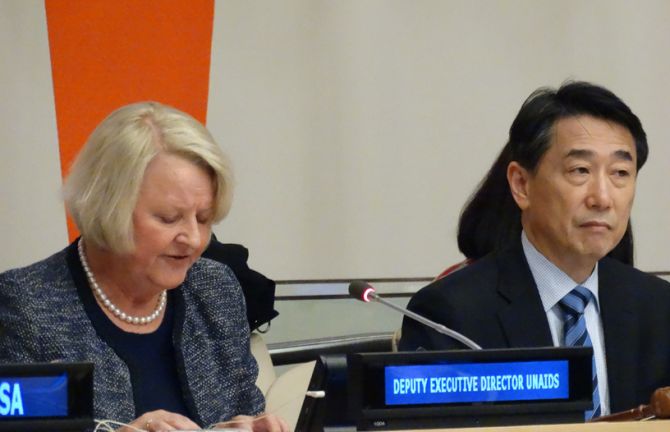
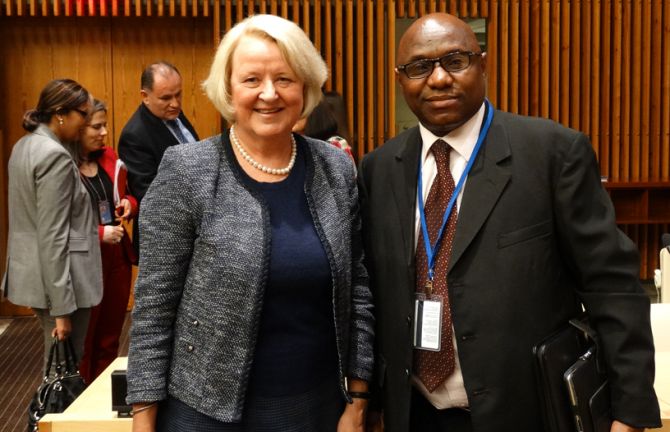
Update
ECOSOC underlines need to fast-track AIDS response
09 April 2015
09 April 2015 09 April 2015The Economic and Social Council (ECOSOC) passed a resolution on UNAIDS encouraging accelerated action and investment in the next five years to be on track to end AIDS as a public health threat by 2030.
Adopted by consensus on 8 April 2015 during ECOSOC’s coordination and management meeting in New York, the resolution welcomes significant gains made in the AIDS response, while underlying that AIDS is not over and that challenges remain.
The ECOSOC resolution welcomes new UNAIDS data and analysis made available over the last two years, which provide compelling evidence for a fast track response to the AIDS epidemic. It also recognizes that responses and resources should focus on evidence-based interventions and specific locations and populations in order to have the greatest impact. Acknowledging the urgent need to close the AIDS resource gap, the resolution encourages countries to scale up domestic and international funding for the response.
Through the resolution, ECOSOC stresses the value of lessons learned from the AIDS response for the post-2015 development agenda. It cites UNAIDS—the only co-sponsored joint programme of the UN system— as a useful example to be considered by the UN system to enhance strategic coherence, coordination, results-based focus, inclusive governance and country-level impact.
Zimbabwe and Switzerland, the Chair and Vice-Chair of the UNAIDS Programme Coordinating Board, co-facilitated Member State consultations on the resolution and introduced it to the Council, following the consideration of the 2015 Report of the Executive Director of UNAIDS.
Quotes
“Ending AIDS as a public health threat by 2030 is no longer seen as a distant dream but as an achievable reality. Advanced data, modelling and analysis developed through the Joint Programme show that there is a critical five-year window of opportunity in which to fast track action and front-load investments, focusing responses where there is the greatest need. This accelerated and focused approach will lay the foundation to end the AIDS epidemic—the next five years will determine the direction of the subsequent ten.”
“The resolution recognizes how progress on AIDS will enable results for broader health, development and rights outcomes. Ending AIDS as a public health threat can be a distinctive, shared triumph in the coming decades that shows what is possible through mobilized communities and global solidarity.”
Related

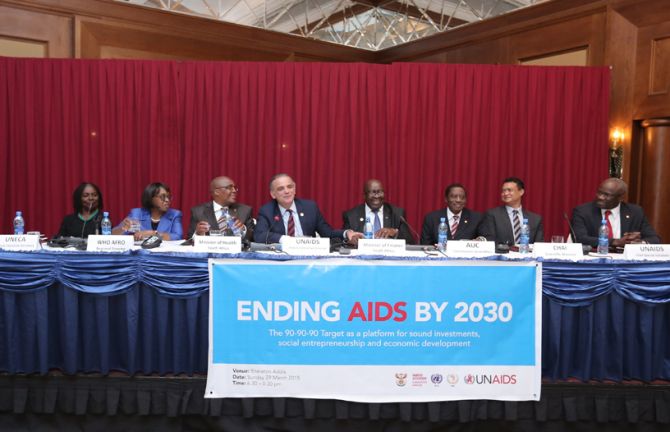
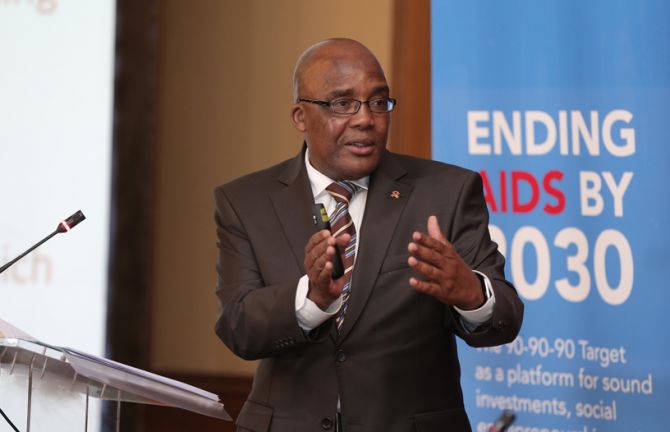
Update
African ministers of finance call for increased investment to end the AIDS epidemic by 2030
01 April 2015
01 April 2015 01 April 2015African ministers of finance and key partners in the AIDS response meeting in Addis Ababa, Ethiopia, have called for increased national investment to end the AIDS epidemic as a public health threat by 2030.
The international community has committed to meeting the 90–90–90 treatment targets, under which 90% of all people living with HIV will know their HIV status, 90% of all people with diagnosed HIV infection will receive sustained antiretroviral therapy and 90% of all people receiving antiretroviral therapy will have viral suppression. If the 90–90–90 targets are met by 2020, ending the AIDS epidemic a decade later is achievable.
The ministers were joined at the meeting, held on 29 March, by representatives of international and regional organizations, United Nations Member States and civil society, as well as other stakeholders. Participants at the high-level event, entitled Ending AIDS by 2030: the 90–90–90 Target as a Platform for Sound Investments, Social Entrepreneurship and Economic Development, stressed that increased domestic investments will bring economic returns. Benefits will include strengthened health systems, long-term cost savings and the encouragement of African pharmaceutical industries.
The event took place on the sidelines of a joint conference of the African Union and the United Nations Economic Commission for Africa entitled Implementing Agenda 2063—Planning, Mobilizing and Financing for Development.
Quotes
“South Africa leveraged the economies of scale generated by the 90–90–90 target to influence the market dynamics of HIV commodities. This includes a recent landmark price reduction of viral load tests.”
“AIDS has eroded decades of health and economic gains and placed a burden on our African countries, but antiretroviral therapy has allowed us to make major progress, and now it is time to harness more resources for 90–90–90 to save lives, costs and to stimulate the continental pharmaceutical industry.”
“If 90% of all people diagnosed with HIV infection should receive sustained antiretroviral therapy, then the continent must move on the trajectory of manufacturing its own drugs and equipment, as envisaged by the Pharmaceutical Manufacturing Plan for Africa.”
“The World Health Organization is committed to working with partners for universal health access, health financing and overcoming communicable diseases, including HIV, as part of the post-2015 development agenda.”
“A healthy and productive population is a precondition for Africa’s structural transformation and sustainable development. We need to increase social investments and budgets for AIDS.”
“We have the evidence and tools to end the epidemic, but we have to change the way we are doing business, accelerate our efforts and enhance the industrial capacity of Africa. Ending the AIDS epidemic is everyone’s business.”
Region/country
- West and Central Africa
- Benin
- Burkina Faso
- Burundi
- Cameroon
- Cape Verde
- Central African Republic
- Chad
- Congo
- Côte d'Ivoire
- Democratic Republic of the Congo
- Equatorial Guinea
- Gabon
- Gambia
- Ghana
- Guinea-Bissau
- Guinea
- Liberia
- Mali
- Mauritania
- Niger
- Nigeria
- Sao Tome and Principe
- Senegal
- Sierra Leone
- Togo
- Eastern and Southern Africa
- Angola
- Botswana
- Comoros
- Eritrea
- Ethiopia
- Kenya
- Lesotho
- Madagascar
- Malawi
- Mauritius
- Mozambique
- Namibia
- Rwanda
- Seychelles
- South Africa
- South Sudan
- Eswatini
- Uganda
- United Republic of Tanzania
- Zambia
- Zimbabwe
Related

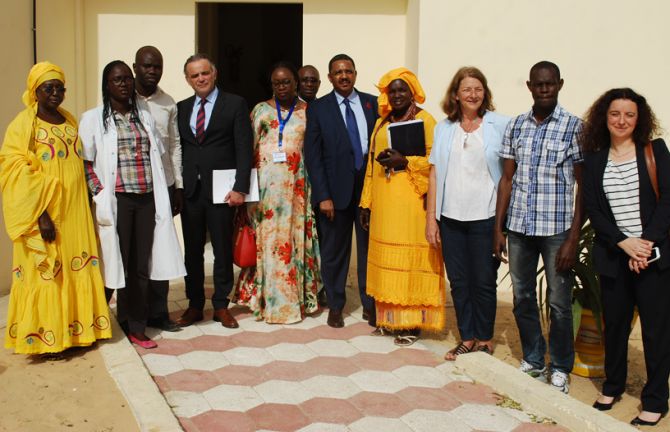
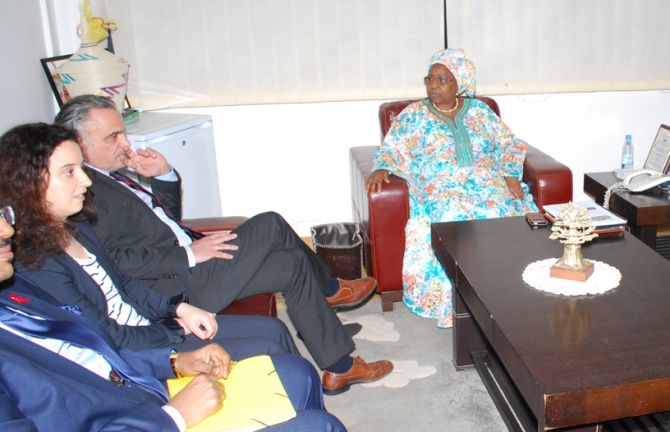
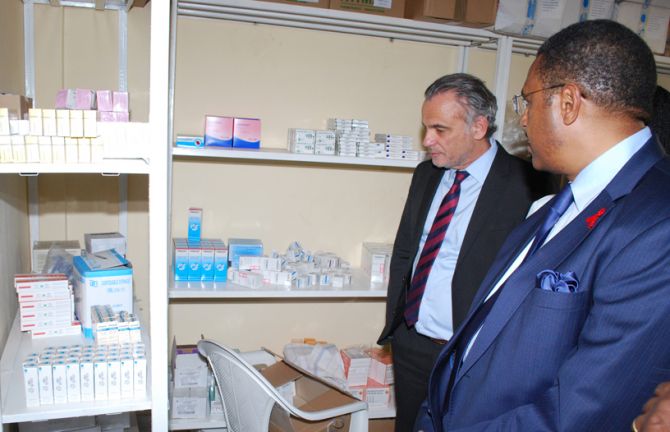
Update
First integrated drug treatment centre in Senegal
02 April 2015
02 April 2015 02 April 2015During a visit to Dakar, Senegal, Luiz Loures, UNAIDS Deputy Executive Director, Programme, praised the work of CEPIAD, a centre that offers integrated care, treatment and counselling services to people who inject drugs.
CEPIAD is the first facility to offer such integrated services in western and central Africa. It strives to reduce drug use and to improve the physical and mental health of clients, including through HIV and hepatitis risk reduction programmes. The centre also helps people to get back to work and to re-integrate into family and social networks.
Quotes
“We come here to eat, shower and get advice on how to protect ourselves from AIDS. They don’t judge us here, they help us.”
“CEPIAD is a good example of applying operational research to national AIDS policy that has a multisectoral approach. Providing care to people who inject drugs is a priority of the national AIDS strategy for 2014–2017.”
“This centre offers a comprehensive range of services for people who inject drugs and should act as an example to the international community.”
Region/country
Related

Update
Strengthening the HIV response in Latin America
30 March 2015
30 March 2015 30 March 2015The Economic Commission for Latin America and the Caribbean (ECLAC) and UNAIDS signed a cooperation agreement this month to strengthen the response to HIV in the Latin America region.
The objective is to join efforts to promote universal access to HIV prevention, treatment, care and support services. The cooperation will focus on developing studies of existing inequalities faced by the people most affected by HIV, analysing the efficiency and sustainability of the regional HIV responses, monitoring the achievement of the internationally agreed development goals and positioning HIV as a priority within the post-2015 agenda.
As part of the ongoing collaboration, Social panorama of Latin America 2014 includes a joint analysis of the shared responsibilities in funding the HIV response in Latin America. Upcoming joint publications will put special emphasis on raising awareness about the inequalities among the populations being left behind and the efficiency and sustainability of HIV programmes in the region.
ECLAC, one of five United Nations regional commissions, was founded in 1948 to contribute to the economic development of Latin America; the promotion of the region's social development was later included among its primary objectives.
Quotes
“The collaboration with the Economic Commission for Latin America and the Caribbean contributes significantly to our work, facilitating high-level advocacy efforts, ensuring sustainability of the HIV response and diminishing social inequalities in the region.”
"The agreement with UNAIDS has to do with our continuous commitment to foster development with equity and environmental sustainability in the Latin American and Caribbean countries."

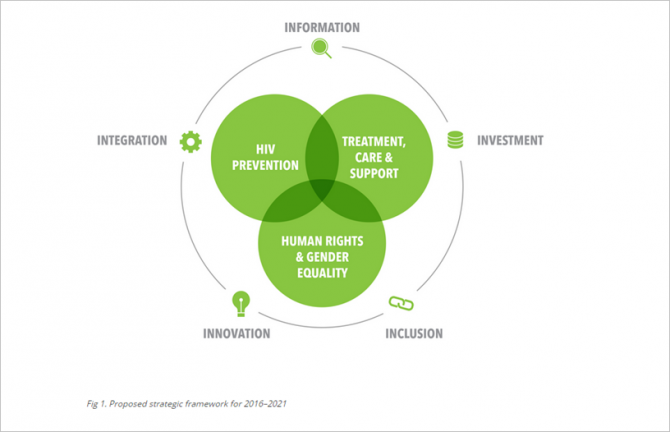
Update
UNAIDS holds virtual consultation for its 2016–2021 Strategy
25 March 2015
25 March 2015 25 March 2015UNAIDS is holding its first round of virtual consultations to develop its 2016–2021 Strategy. From 23 March to 2 April, the consultation process will be open to everyone to share information, ideas and experiences on how to accelerate rights-based, evidence-informed action to Fast-Track the AIDS response.
Three overarching topics will guide the moderated discussions. Participants are encouraged to provide comments focused on reinforcing the achievements made so far, closing the gaps and seizing the “game-changers”. A specific discussion forum, with support from the network of youth organizations, PACT, will be devoted to the participation and priorities of young people in the AIDS response.
The new UNAIDS Strategy is expected to guide progress towards achieving the ambitious Fast-Track Targets through front-loading investment and accelerating rights-based action to enable countries to end the AIDS epidemic as a public health threat by 2030.
Quotes
“Through the leadership and engagement of all of our partners, we are building an action-oriented strategy to Fast-Track the AIDS response, setting us squarely on the path towards ending the AIDS epidemic.”
"We cannot think about advancing to a new strategy and at the same time trying to keep almost everything from the old strategy. Science has advanced, new information and tools are available. The world has changed, so we need to be open minded to new evidence-based ideas and not stick to the same things, just because we do not want to move outside our comfort zones."
Related

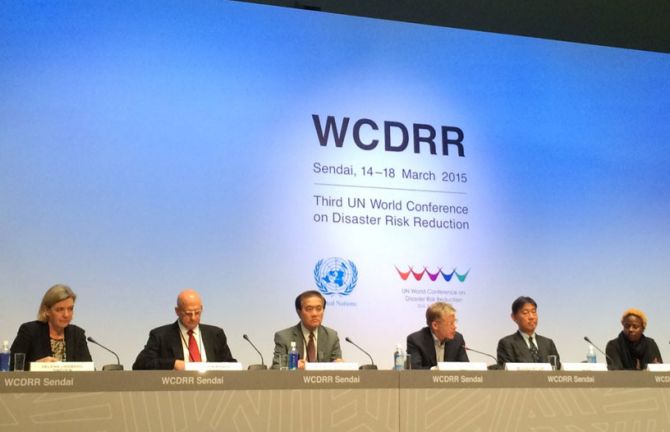
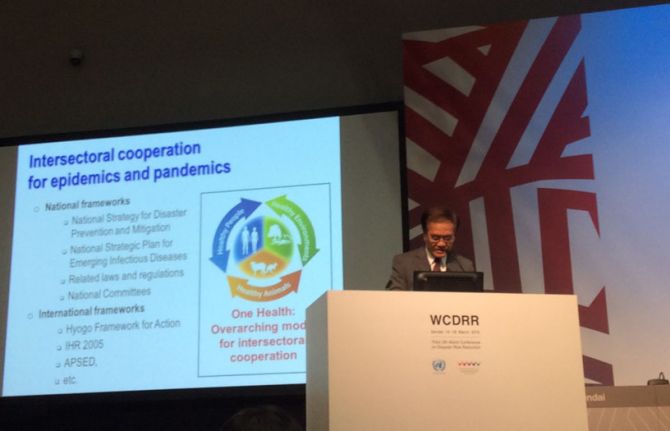
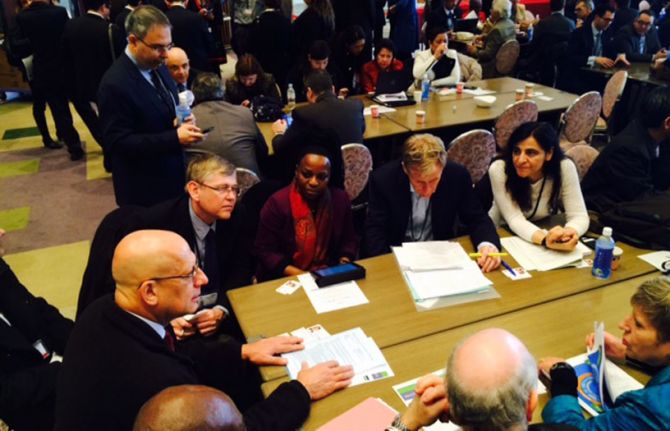
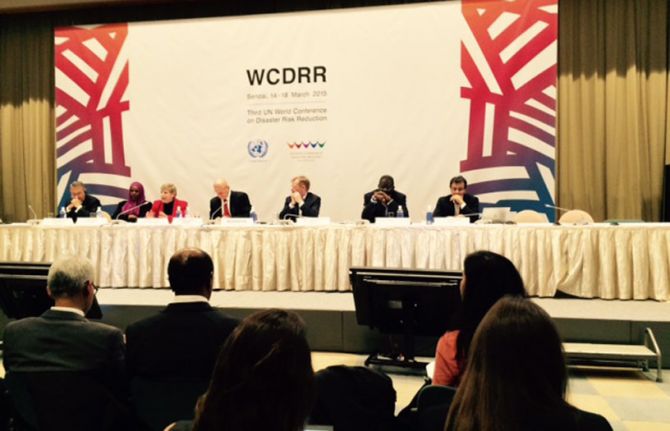
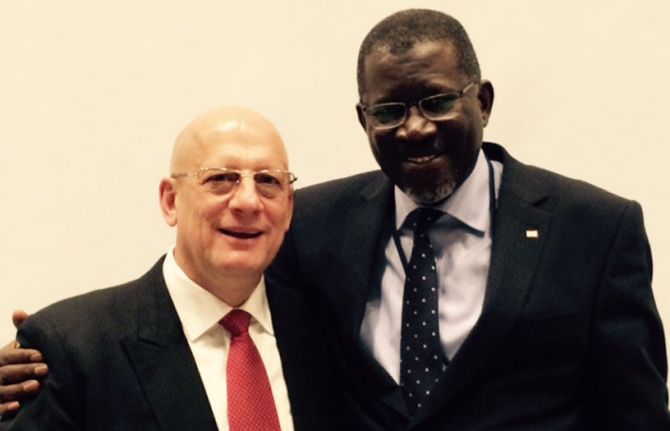
Update
The world meets to discuss disaster risk reduction at high-level UN conference
17 March 2015
17 March 2015 17 March 2015Disasters are an increasing threat to the lives and livelihoods of millions of people around the globe and can have a profound impact on social, economic and health outcomes. Participants at the Third United Nations World Conference on Disaster Risk Reduction, taking place in Sendai, Japan, are discussing how to promote a sustainable development agenda addressing risk and supporting greater resilience for countries and communities.
The high-level meeting, which is taking place from 14 to 18 March, is being attended by UN Secretary-General Ban Ki-moon, several heads of state, a number of UN heads of agencies and more than 100 ministers. It also includes some 8000 delegates from government, civil society, the private sector and donor agencies, as well as tens of thousands of members of the public attending the various public forums.
A broad array of issues are being debated over the five days, ranging from how to cope with emergency disasters, such as earthquakes, droughts and tsunamis, to reducing the risks of epidemics, such as Ebola, bird flu and HIV. Emphasis is being placed throughout on providing practical solutions to protect the most vulnerable. There is also a recognition that efforts to achieve key development, economic and health goals cannot succeed when disasters continue to erode progress and cost hundreds of billions of dollars a year globally.
UNAIDS has a significant presence at the conference and is co-organizing, with WHO, UNFPA and UNISDR, a number of official events, including a day-long public forum on protecting people’s health from disaster risks.
A dominant theme across these events involves showcasing how risk reduction in the post-2015 development agenda can draw on the experience, lessons learned and successes of the AIDS response. The importance of mobilizing vulnerable communities, putting them at the centre of disaster prevention, preparedness, recovery and rehabilitation efforts, is being highlighted, along with the need to foster effective shared accountability. Mainstreaming health interventions across risk management programmes is also a prominent message.
A post-2015 framework for disaster risk reduction, which will govern this area for the next 15 years, will emerge from the conference. Health is fully embedded in the current framework, with particular mention of pandemics and epidemics. A Sendai Declaration will also be adopted reaffirming political commitment to strengthen efforts and cooperation for disaster risk reduction worldwide.
Quotes
"The bottom line is that resilience can never be produced in isolation—we need to bring actors together and provide the means for multisectoral coordination based on a “whole of society approach”.
“Communities are the foundation stone for global disaster resilience. Lessons of preparedness and recovery from disasters and epidemics, including HIV and Ebola, demonstrate that people and communities succeed when placed at the centre of decision-making and action.”
“Strengthening health systems must go hand in hand with community strengthening and resilience. This is where the Red Cross and Red Crescent volunteers come in, putting people at the centre, accompanying communities to address their needs and building on their norms, values and knowledge.”
“In the 10 years since Hyogo, governments have increasingly recognized that healthy people are resilient people and that resilient people recover much more quickly from emergencies and disasters.”
“Health and well-being underpin resilience, which is something a disaster risk reduction framework cannot succeed without. This is why health is such an essential component of the post-2015 framework.”

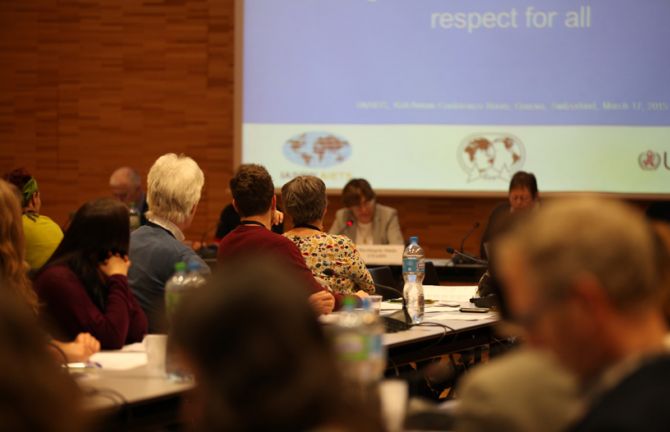
Update
Social workers join efforts to end the AIDS epidemic by 2030
17 March 2015
17 March 2015 17 March 2015At an event held to mark World Social Work Day on 17 March, participants representing schools of social work, nongovernmental organizations, the United Nations and countries explored ways in which social workers can join efforts to end the AIDS epidemic by 2030.
The meeting, which was organized by the International Association of Schools of Social Work and the International Federation of Social Workers, with support from UNAIDS, celebrated the contributions social workers make in providing social and health services to vulnerable populations and looked at how best to collaborate on the AIDS response.
During the meeting, held at UNAIDS headquarters in Geneva, Switzerland, the participants called for dignity and respect for all, including poor and marginalized people that social workers often work with. Since HIV does not exist in isolation or relate solely to health, an integrated approach was recommended to address psychological, physical and social needs.
The participants acknowledged that gaps exist in the AIDS response, and noted that social workers can contribute significantly to ensuring that no one is left behind.
Social workers can make a difference by scaling up proven social policies and social protection programmes that focus on key populations and by extending their services to locations where there is the greatest need for them.
The International Association of Schools of Social Work and the International Federation of Social Workers pledged to expand their partnership with UNAIDS and to apply the principles of social work to the AIDS response by protecting the rights and dignity of people accessing HIV services.
Quotes
“People living with HIV and people most affected by HIV have multiple and often intractable needs that no one sector can provide effectively. The social work profession and social protection programmes connect people to services and make services work for people.”
“Social workers accompany people through the emotional and psychological journeys associated with HIV infection. This is a very personal experience and impacts on the outcomes and later life experience of people living with and affected by HIV. To ignore investing in this part of the complex matrix of HIV will result in the “sticking plaster” approach rather than long-term sustained recovery.”
“People who are most vulnerable—sex workers, injecting drug users, transgender people, men who have sex with men, women and children affected by HIV—need great attention from social workers and social service workers, who can ensure that social protection programmes reach them and they are treated with dignity and respect.”
“I understand disclosure of HIV status to be a two-sided process: it takes me as a person living with HIV to talk about it and my community to accept me. To achieve zero discrimination, we need to support more proactively the complex process of disclosure. That is, to accompany those living in fear, evaluate what they need to overcome it and empower and enable those who are disclosing to do solidarity work in their communities.”


Update
UNAIDS National Goodwill Ambassador for China James Chau selected as a Young Global Leader
17 March 2015
17 March 2015 17 March 2015The World Economic Forum has selected James Chau, UNAIDS National Goodwill Ambassador for China and television personality, to join its Forum of Young Global Leaders.
The Forum of Young Global Leaders is a community of young leaders from around the world who contribute fresh thinking, multi stakeholder engagement and dynamic new ways of collaborating to develop solutions to complex global issues. The 900 Young Global Leaders are already successful and accomplished in their own fields. They join a broad community of other young leaders who commit both their time and talent to have a positive impact on global challenges.
As the main anchor for 10 years for China Central Television’s (CCTV’s) English Channel, Mr Chau has reported on key global events and development issues. He is currently Special Contributor to CCTV News and a columnist with the Huffington Post. He is also active across social media, with a following of 1.7 million on the Chinese microblogging site Weibo.
Since his appointment in 2009, Mr Chau has used television and digital media platforms to help support people living with and affected by HIV.
Quotes
“James is a passionate and dynamic young leader whose work on HIV has helped to raise awareness and reduce stigma and discrimination. I congratulate him on his admission to the Forum of Young Global Leaders.”








